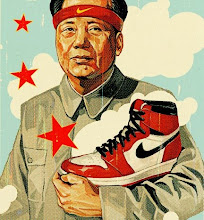There i said it. Everyone is thinking it. You know you are too.
I would like to first state that I love China. I was born here and have been living here for more than 2 years. I have family here and a lot of friends too. I feel a incredible pride of being Chinese in the current state in the world as well as understand the burden of its history. I really do understand. It's in me.
As much as I enjoy living here, I have found China to be an incredibly frustrating place to live. People from the outside would make general arguments for this fact... ie. the water is dirty or the air is polluted, but the real frustration comes from all of the little things. These little things cant be seen or even understood by someone who hasnt lived in China. It builds up slowly until one day, you know you have to just get out of here.
When one first moves to China, everything is new and exciting. It can even initially be fun and interesting as something that is embrassed. However, given the right amount of time, these things become less fun/interesting. It's ok to laugh it off for a little bit of time, but after actually living with it everyday.... things change. Of course all of these little things can be properly explained and put into context of cultural difference, social development, a large population, ect. As a visitor in any new country, one has to accept the local society and its customs. However, that doesnt make day-to-day life easier.
So what are these little things? Here's a list:
1. The inability to just relax. The sheer number of people in China makes it so that is are people EVERYWHERE. I have never been anywhere where it was just me and no one else - where I can take a deep breath and get away from it all. 就不能安静下来. Even in places like your own apartment, the bathroom or anywhere else private, there are tons of ambiant noise caused by all of the people.
2.The horrible service. Although the general service is improving, it still lacks a huge amount to a solid benchmark. Examples include:
- Waiting for hours in line at the bank where there is only 1 teller serving dozens of people
- Any small mistake on any form will mean redoing that form
- The amount of BS paperwork and incovenient transaction materials for just about any service including banking, general utilities, phone, ect.
- Really long waits for any service at restaurants where a question or request can be left unanswered for more than 15 minutes
- Some employees telling you the wrong thing while managers tell you the right thing
- Basic lack of common sense where the idea that the "customer is right" doesnt exist
- General inefficency
- Spitting on the street to spitting on the floor indoors and even airport terminals
- Blatent littering when trash cans are close by (I've found myself picking up after other people)
- Smoking in McDonald's or other non-smoking places
- Not waiting in line for anything and pushing your way through to the front
- Really loud disturbing conversations in restaurants or on cell phones
- Taxi drivers swirving left and right in and out of traffic
- Drivers sometime ignoring red lights or going in the wrong way on a street
- Cars parked waiting for someone along the side of the road that blocks off traffic for
- People standing in the street for buses
- Jaywalking on really busy 8-lane intersections
- People dragging carts along the street filled with random stuff.
All of these isses and problems all combine after a certain amount of time to build up incredible frustration in just about everyone I know. Good people become the epitome of the "ugly American" with this built up in their system.
I was talking to a friend of mine who is the nicest girl you would ever meet. She told me a story of how she just flipped out at a taxi driver after he said he couldnt take her to her destination becuase he was about to go off duty and had to return the car. She felt horrible afterwards and felt bad for the taxi driver who was only doing his job. That didnt prevent her from venting out yelling at him. That's something I would never expect from her.
Even my mom agrees. She has lived 60% of her life in China and 40% in the US. She comes back on business trips every year and loves it for a while. However, she would never be able to live here for an extended amount of time anymore.
I've seen myself become increasingly frustrated over time as well. After a while, you just cant help it but to be chippy douche to people, even friends. It's just one of those things. Maybe this is why all of the Chinese rich people are moving out to places where there are less people.
The only remedy is to get out of China for a while and go on vacation. The key is to get back to a place where these small things dont exist, or that they exist but are interpreted by a tourist mindset of acceptance, not a constant annoyance. Thank goodness Shenzhen, is so close to Hong Kong, Macau and SE Asia. A couple of days on the Thailand beaches really does wonders. Bali, here I come.



